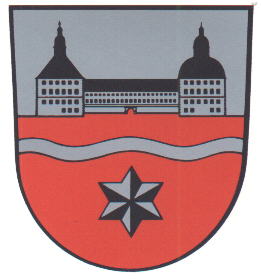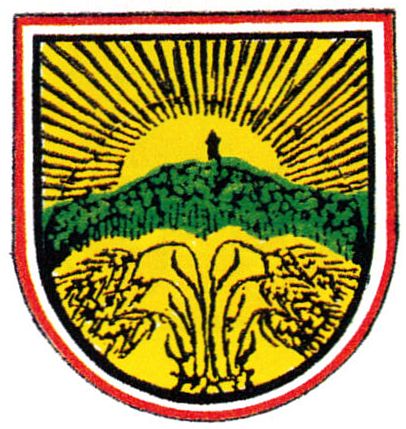Gotha (kreis): Difference between revisions
Knorrepoes (talk | contribs) m (Text replacement - "Literature" to "Literature") |
Knorrepoes (talk | contribs) m (Text replacement - ".jpg|center]]" to ".jpg|center|Wappen von {{PAGENAME}}]]") |
||
| Line 16: | Line 16: | ||
The previous arms were adopted on December 3, 1948.<br> | The previous arms were adopted on December 3, 1948.<br> | ||
[[FIle:gotha1.kreis.jpg|center]] | [[FIle:gotha1.kreis.jpg|center|Wappen von {{PAGENAME}}]] | ||
The arms show the Inselberg, the highest point in the district with a tower in front of a rising sun. The base shows six wheat-ears symbol for the importance of agriculture. | The arms show the Inselberg, the highest point in the district with a tower in front of a rising sun. The base shows six wheat-ears symbol for the importance of agriculture. | ||
Revision as of 17:14, 29 October 2016
This page is part of the German heraldry portal Deutsche Wappensammlung |
Heraldry of the World |
|
German heraldry:
|
Selected collector's items from Germany:
|
GOTHA (GTH)
State : Thüringen
Additions : 1994 Erfurt (partly) and small parts of Arnstadt and Langensalza
Official blazon
Origin/meaning
The arms were granted on June 28, 1991.
The upper part shows the Friedenstein castle, the largest baroque castle in Europe. The wavy bar is the Leina canal, dug in the 14th century to supply the city of Gotha with water. The star is derived from the old arms of the Duchy of Sachsen-Gotha-Altenburg.
The previous arms were adopted on December 3, 1948.
The arms show the Inselberg, the highest point in the district with a tower in front of a rising sun. The base shows six wheat-ears symbol for the importance of agriculture.
Contact and Support
Partners:
Your logo here ?
Contact us
© since 1995, Heraldry of the World, Ralf Hartemink 
Index of the site
Literature : Linder and Olzog, 1996.













